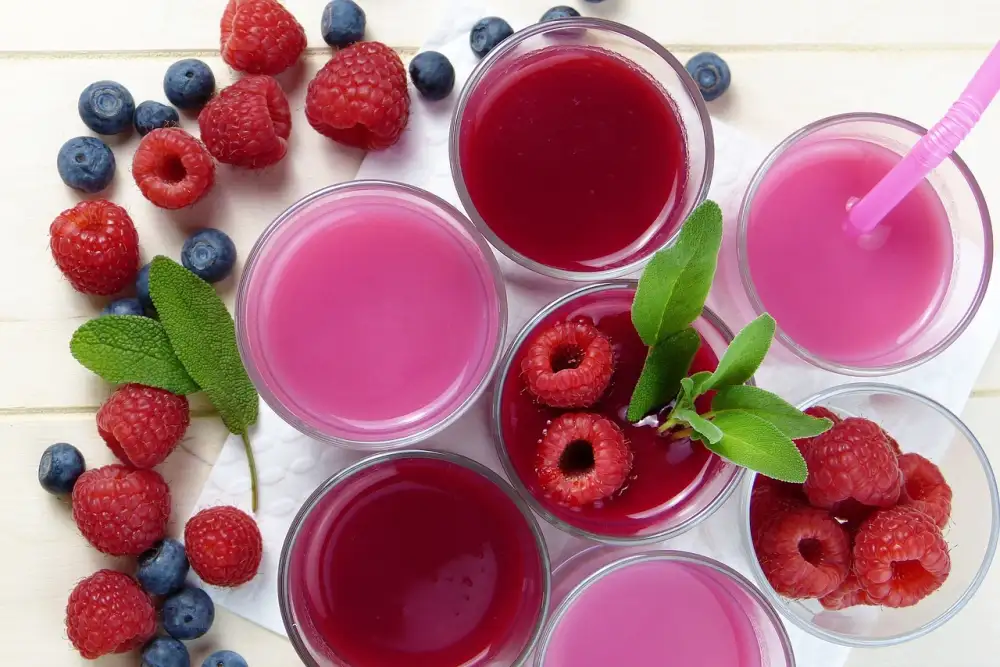Revitalize Your Health with the Ultimate Juice Diet Guide

The juice diet has gained popularity in recent years as a way to detoxify the body and promote weight loss. This diet involves consuming only fresh fruit and vegetable juices for a certain period of time, typically ranging from a few days to several weeks. The idea behind this diet is that by eliminating solid foods and focusing solely on nutrient-rich juices, you can give your digestive system a break while flooding your body with vitamins, minerals, and antioxidants. In this article, we will explore the benefits of the juice diet, how it works, types of juices to include in the diet, tips for success, potential risks and precautions, as well as provide you with a sample juice diet plan. Whether you are looking to jumpstart your health journey or simply want to try something new, the juice diet may be just what you need to revitalize your health.
Benefits of the Juice Diet
The Juice Diet offers numerous benefits for those looking to revitalize their health. Firstly, it provides a convenient and efficient way to consume a wide variety of fruits and vegetables, ensuring that you get all the essential nutrients your body needs. Juices are also rich in antioxidants, which help fight against free radicals and promote overall well-being.
Additionally, the Juice Diet can aid in weight loss as it is low in calories while still providing necessary vitamins and minerals. It can also improve digestion by giving your digestive system a break from processing solid foods.
Furthermore, the high water content in juices helps to hydrate the body and flush out toxins, resulting in clearer skin and improved complexion. The Juice Diet can also boost energy levels, enhance mental clarity, and strengthen the immune system.
Overall, incorporating fresh juices into your diet can lead to increased vitality, improved nutrient absorption, and better overall health.
How the Juice Diet Works
The juice diet is a popular detoxification and weight loss method that involves consuming only fresh fruit and vegetable juices for a certain period of time. The idea behind this diet is to provide your body with essential nutrients while giving your digestive system a break from processing solid foods.
When you consume only juices, your body receives an abundance of vitamins, minerals, and antioxidants in an easily digestible form. These nutrients are quickly absorbed into your bloodstream, providing instant nourishment to your cells and organs. This can lead to increased energy levels, improved digestion, clearer skin, and enhanced overall health.
By eliminating solid foods from your diet, the juice diet allows your body to focus on cleansing and detoxifying itself. It helps to flush out toxins accumulated from processed foods, environmental pollutants, and unhealthy lifestyle choices. This can result in improved liver function, better digestion, and a strengthened immune system.
Additionally, the juice diet can aid in weight loss as it restricts calorie intake while still providing essential nutrients. Juices are low in calories but high in fiber content which keeps you feeling full for longer periods of time. This helps to reduce cravings and prevent overeating.
To make the most out of the juice diet, it is important to use a variety of fruits and vegetables that are rich in different nutrients. This ensures that you receive a wide range of vitamins and minerals necessary for optimal health. It is also recommended to include some green juices in your diet as they are packed with chlorophyll which aids in detoxification.
It's important to note that the juice diet should not be followed for an extended period of time as it may lead to nutrient deficiencies or muscle loss. It is best used as a short-term cleanse or as part of a balanced eating plan.
In the next section, we will explore different types of juices that you can include in your juice diet for maximum benefits.
Types of Juices to Include in the Diet
When it comes to the Juice Diet, there are countless options to choose from when deciding which juices to include in your daily routine. Here are some popular and nutritious choices:
1. Green Juices: Packed with leafy greens like spinach, kale, and cucumber, these juices are rich in vitamins, minerals, and antioxidants. They help detoxify the body and boost energy levels.
2. Citrus Juices: Oranges, lemons, grapefruits - these fruits are not only refreshing but also high in vitamin C. Citrus juices aid in digestion and support a healthy immune system.
3. Beetroot Juice: This vibrant juice is known for its detoxifying properties and ability to improve blood circulation. It's also packed with essential nutrients like iron and folate.
4. Carrot Juice: Carrots are a great source of beta-carotene, which is converted into vitamin A in the body. This juice promotes healthy skin, boosts eye health, and strengthens the immune system.
5. Berry Juices: Blueberries, strawberries, raspberries - these antioxidant-rich fruits make delicious juices that can help fight inflammation and promote brain health.
6. Watermelon Juice: Not only is watermelon juice incredibly hydrating, but it's also low in calories and high in vitamins A and C. It's perfect for hot summer days!
Remember to experiment with different combinations of fruits and vegetables to find what suits your taste buds best. Incorporating a variety of juices will ensure you get a wide range of nutrients while enjoying a flavorful journey towards better health!
Tips for a Successful Juice Diet
1. Choose fresh and organic produce: Opt for fruits and vegetables that are free from pesticides and chemicals to maximize the nutritional benefits of your juice.
2. Variety is key: Experiment with different fruits, vegetables, and herbs to keep your taste buds engaged and ensure you receive a wide range of nutrients.
3. Stay hydrated: In addition to consuming juices, it's important to drink plenty of water throughout the day to stay properly hydrated.
4. Listen to your body: Pay attention to how your body responds to the juice diet. If you feel weak or lightheaded, consider incorporating small meals or snacks into your routine.
5. Plan ahead: Prepare your juices in advance and store them in airtight containers in the refrigerator to make it easier to stick to your juice diet plan.
6. Incorporate fiber-rich ingredients: To maintain healthy digestion, include ingredients like chia seeds or flaxseeds in your juices or consume whole fruits and vegetables alongside your juices.
7. Take it slow: Start by replacing one meal with a juice and gradually increase the number of juice meals as you become more comfortable with the diet.
Remember, consulting with a healthcare professional before starting any new diet is always recommended for personalized advice on nutrition and health.
Potential Risks and Precautions of the Juice Diet
While the juice diet can offer numerous health benefits, it is important to be aware of potential risks and take necessary precautions. Firstly, it is essential to consult with a healthcare professional before starting any new diet, especially if you have any pre-existing medical conditions or are taking medications.
One of the main concerns with the juice diet is that it may not provide all the essential nutrients your body needs for optimal functioning. Since juices primarily consist of fruits and vegetables, they may lack in certain macronutrients like protein and healthy fats. It is crucial to ensure that you are consuming a variety of juices that include a balance of different fruits and vegetables to meet your nutritional requirements.
Another risk associated with the juice diet is its potential impact on blood sugar levels. Juices are high in natural sugars from fruits, which can cause rapid spikes in blood sugar levels. This can be problematic for individuals with diabetes or insulin resistance. Monitoring blood sugar levels regularly and working closely with a healthcare professional is recommended for those with these conditions.
Furthermore, some people may experience digestive issues such as bloating or diarrhea when transitioning to a juice-only diet. This can be due to the sudden increase in fiber intake or changes in gut bacteria. Gradually incorporating juices into your diet and staying hydrated can help mitigate these issues.
Lastly, long-term adherence to a strict juice-only diet may lead to nutrient deficiencies and muscle loss. It is advisable to use the juice diet as a short-term cleanse or detox rather than a long-term lifestyle change.
In conclusion, while the juice diet has its benefits, it also comes with potential risks. It is crucial to approach this diet with caution, consult with a healthcare professional, and ensure you are meeting your nutritional needs through a balanced variety of juices.
Sample Juice Diet Plan
Here is a sample juice diet plan to help you get started on your journey towards revitalizing your health. Remember, it's important to consult with a healthcare professional before starting any new diet.
Day 1:
- Breakfast: Green juice made with spinach, kale, cucumber, celery, and apple.
- Snack: Carrot and ginger juice.
- Lunch: Beetroot and orange juice.
- Snack: Pineapple and mint juice.
- Dinner: Tomato and bell pepper juice.
Day 2:
- Breakfast: Blueberry and banana smoothie made with almond milk.
- Snack: Watermelon and lime juice.
- Lunch: Cucumber, lemon, and parsley juice.
- Snack: Mango and coconut water smoothie.
- Dinner: Spinach, avocado, and kiwi juice.
Day 3:
- Breakfast: Strawberry and almond milk smoothie.
- Snack: Grapefruit and ginger juice.
- Lunch: Carrot, apple, and ginger juice.
- Snack: Papaya and lime juice.
- Dinner: Broccoli, pear, and mint juice.
Remember to drink plenty of water throughout the day to stay hydrated. Feel free to customize this plan according to your taste preferences. Enjoy the journey towards a healthier you!
Note that this is just a sample plan; it's essential to listen to your body's needs during the diet.
In conclusion, the juice diet can be a great way to revitalize your health and boost your energy levels. It offers numerous benefits such as weight loss, improved digestion, and increased intake of vitamins and minerals. However, it may not be suitable for everyone. If you have any underlying health conditions or are on medication, it is important to consult with a healthcare professional before starting the juice diet. Additionally, it is crucial to listen to your body and ensure you are getting all the necessary nutrients during the diet. Ultimately, whether or not the juice diet is right for you depends on your individual needs and goals.
Published: 14. 12. 2023
Category: Health



